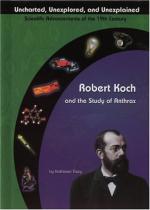|
This section contains 677 words (approx. 3 pages at 300 words per page) |

|
1843-1910
German Physician
Robert Koch was a key player in the field of bacteriology and, ultimately, hygiene and public health. His brilliant research uncovered the causes of anthrax, tuberculosis, and cholera, and led to the development of Koch's Postulates, a series of guidelines for the study of infectious diseases that are still used today.
Koch was born on December 11, 1843, in Clausthal, Germany, a mining town in the Harz Mountains. As a boy he loved natural science and collected rocks and plants and dreamed of being a great explorer. He studied at the University of Göttingen and, after interning in Hamburg, married and settled down to become a country doctor. Upon receiving a microscope for his 28th birthday, he began to study many things, including anthrax, a dreaded disease of warm-blooded animals, especially sheep. Isolating the organism from the blood, he grew...
|
This section contains 677 words (approx. 3 pages at 300 words per page) |

|


